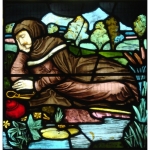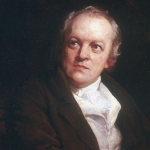In a somer seson, whan softe was þe sonne,
I shoop me into [a] shrou[d] as I a sheep weere,
In habite as an heremite, vnholy of werkes,
Wente wide in þis world wondres to here.
Ac on a May morwenynge on Maluerne hilles
Me bifel a ferly, of Fairye me þoȝte.
I was wery forwandred and wente me to reste
Under a brood bank by a bourn[e] syde;
And as I lay and lenede and loked on þe watres,
I slombred into a slepyng, it sweyed so murye.
þanne gan I meten a merveillous swevene,
þat I was in a wildernesse, wiste I neuere where.
[Ac] as I biheeld into þe Eest, an heiȝ to þe sonne,
I seiȝ a tour on a toft trieliche ymaked,
A deep dale byneþe, a dongeon þerInne,
Wiþ depe diches and derke and dredfulle of siȝte.
A fair feeld ful of folk fond I þer bitwene
Of alle manere of men, þe meene and þe riche,
Werchynge and wandrynge as þe world askeþ.
Somme putten hem to þe plouȝ, pleiden ful selde,
In settynge and sowynge swonken ful harde;
And wonnen þat [þise] wastours with glotonye destruyeþ
And somme putten hem to pride, apparailed hem þerafter,
In contenaunce of cloþynge comen d[is]gised.
In preieres and penaunc[e] putten hem manye,
Al for þe love of oure lord lyveden [wel] streyte
In hope [for] to have heveneriche blisse. |
As Ancres and heremites þat holden hem in hire selles,
Coueiten noȝt in contree to [cairen] aboute
For no likerous liflode hire likame to plese.
And somme chosen [hem to] chaffare; þei cheveden þe bettre
As it semeþ to oure siȝt þat swiche men þryveþ.
And somme murþes to make as Mynstralles konne,
And geten gold with hire glee [gilt]lees, I leeue.
Ac Iaperes and Iangeleres, Iudas children,
[Fonden] hem fantasies and fooles hem makeþ,
And han wit at wille to werken if [hem liste].
That Poul precheþ of hem I [dar] nat preue it here;
Qui loquitur turpiloquium is luciferes hyne.
Bidderes and beggeres faste aboute yede
[Til] hire bel[y] and hire bagg[e were bret]ful ycrammed;
[Flite þanne] for hire foode, fouȝten at þe ale.
In glotonye, god woot, go þei to bedde,
And risen [vp] ribaudie [as] Roberdes knaues;
sleep and sleuþe seweþ hem euere.
Pilgrymes and Palmeres pliȝten hem togidere
For to seken Seint Iame and Seintes at Rome;
Wenten forþ in hire wey wiþ many wise tales,
And hadden leue to lyen al hire lif after.
I seiȝ somme þat seiden þei hadde ysouȝt Seintes:
To ech a tale þat þei tolde hire tonge was tempred to lye
Moore þan to seye sooþ, it semed bi hire speche.
Heremytes on an heep with hoked staues |
Wenten to walsynȝam, and hire wenches after;
Grete lobies and longe þat loþe were to swynke
Cloþed hem in copes to ben knowen from oþere;
Shopen hem heremytes hire ese to haue.
I fond þere Freres, alle þe foure ordres,
Prechynge þe peple for profit of [þe wombe];
Glosed þe gospel as hem good liked;
For coueitise of copes construwed it as þei wolde.
Manye of þise maistre[s mowe] cloþen hem at likyng
For hire moneie and hire marchaundiȝe marchen togideres.
Siþ charite haþ ben chapman and chief to shryue lordes
Manye ferlies han fallen in a fewe yeres.
But holy chirche and hij holde bettre togidres
The mooste meschief on molde is mountynge [vp] faste.
Ther preched a pardoner as he a preest were;
Brouȝte forþ a bulle wiþ Bisshopes seles,
And seide þat hymself myȝte assoillen hem alle
Of falshede of fastynge, of Auowes ybroken.
Lewed men leved [hym] wel and liked hi[s speche];
Comen up knelynge to kissen hi[s] bull[e].
He bonched hem with his breuet and blered hire eiȝen,
And rauȝte with his Rageman rynges and broches.
Thus [ye] gyuen [youre] gold glotons to helpe,
And leneþ it losels þat leccherie haunten.
Were þe Bisshop yblessed and worþ boþe his eris,
His seel sholde noȝt be sent to deceyue þe peple.
It is noȝt by þe bisshop þat þe boy precheþ;
[Ac] þe parisshe preest and þe pardoner parten þe siluer
That þe [pouere peple] of þe parissche sholde haue if þei ne were. |
Persons and parisshe preestes pleyned hem to þe Bisshop
That hire parissh[e] wer[e] pouere siþ þe pestilence tyme,
To haue a licence and leue at London to dwelle,
[To] syngen þer for symonie, for siluer is swete.
Bisshopes and Bachelers, boþe maistres and doctours,
That han cure under crist, and crownynge in tokene
And signe þat þei sholden shryuen hire parisshens,
Prechen and praye for hem, and þe pouere fede,
Liggen at Londoun in Lenten and ellis.
Somme seruen þe kyng and his siluer tellen,
In Cheker and in Chauncelrie chalangen his dettes
Of wardes and of wardemotes, weyues and streyves.
And somme seruen as seruauntȝ lordes and ladies,
And in stede of Stywardes sitten and demen.
Hire messe & hire matyns and many of hire houres
Arn doone vndeuoutliche; drede is at þe laste
Lest Crist in Consistorie acorse ful manye'
I parceyued of þe power þat Peter hadde to kepe
To bynden and vnbynden, as þe book telleþ
How he it lefte wiþ loue as oure lord hiȝte
Amonges foure vertues, [most vertuous of alle],
That cardinals ben called and closynge yates
There [crist is in] kyngdom, to close and to shette,
And to opene it to hem and heuene blisse shewe.
Ac of þe Cardinals at court þat kauȝte of þat name,
And power presumed in hem a pope to make
To han [þe] power þat Peter hadde—impugnen I nelle—
For in loue and in lettrure þe eleccion bilongeþ;
Forþi I kan & kan nauȝt of court speke moore. |
þanne kam þer a kyng: knyȝthod hym ladde;
Might of þe communes made hym to regne.
And þanne cam kynde wit and clerkes he made
For to counseillen þe kyng and þe commune saue.
The kyng and knyȝþod and clergie boþe
Casten þat þe commune sholde [hire communes] fynde.
The commune contreved of kynde wit craftes,
And for profit of all þe peple Plowmen ordeyned
To tilie and to trauaille as trewe lif askeþ.
The kyng and þe commune and kynde wit þe þridde
Shopen lawe and leaute, ech [lif] to knowe his owene.
Thanne loked up a lunatik, a leene þyng wiþalle,
And knelynge to þe kyng clergially he seide,
‘Crist kepe þee, sire kyng, and þi kyngryche,
And lene þee lede þi lond so leaute þee louye,
And for þi riȝtful rulyng be rewarded in hevene’
And siþen in þe eyr on heiȝ an aungel of hevene
Lowed to speke in latyn, for lewed men ne koude
Iangle ne Iugge þat Iustifie hem sholde,
But suffren and serven; forþi seide þe Aungel,
‘Sum Rex, sum Princeps; neutrum fortasse deinceps.
O qui iura regis Christi specialia regis,
Hoc qiiod agas melius, iustus es, esto pius!
Nudum ius a te vestiri vult pietate.
Qualia vis mietere, talia grana sere.
Si ius nudatur, nudo de iure metatur;
Si seritur pietas, de pietate metas’.
Thanne greued hym a Goliardeis, a gloton of wordes,
And to þe Aungel an heiȝ answerde after:
‘Dumrex a regeredicatur nomen habere
Nomen habet sine re nisi studet iura tenere.’
þanne [c]an al þe commune crye in vers of Latyn
To þe kynges counseil, construe whoso wolde,
‘Precepta Regis sunt nobis vincula legis’.
Wiþ þat ran þer a route of Ratons at ones
And smale mees myd hem; mo þan a þousand
Comen to a counseil for þe commune profit;
For a cat of a [court] cam whan hym liked
And ouerleep hem liȝtliche and lauȝte hem at his wille
And pleide wiþ hem perillousli and possed aboute.
‘For doute of diuerse d[e]des we dar noȝt wel loke,
And if we grucche of his gamen he wol greuen vs alle,
Cracchen vs or clawen vs, and in hise clouches holde
That vs loþeþ þe lif er he late vs passe.
Miȝte we wiþ any wit his wille wiþstonde,
We myȝte be lordes o lofte and lyuen at oure ese.'
A Raton of renoun, moost renable of tonge,
Seide for a souereyn [salue] to [hem alle].
‘I haue yseyen segges’, quod he, ‘in þe Cite of Londoun
Beren beiȝes ful briȝte abouten hire nekkes,
And somme colers of crafty werk; vncoupled þei wen[d]en
Boþe in wareyne and in waast where hem [leue] like[þ];
And ouþer while þei arn elliswhere, as I here telle.
Were þer a belle on hire beiȝe, by Iesu, as me þynkeþ,
Men myȝte witen wher þei wente and [hire] wey r[oum]e. |
And riȝt so’, quod þat Raton, ‘Reson me sheweþ
To bugge a belle of bras or of briȝt siluer
And knytten it on a coler for oure commune profit
[And hangen it vpon þe cattes hals; þanne here we mowen]
Wher he ryt or rest or r[om]eþ to pleye;
And if hym list for to laike, þanne loke we mowen
And peeren in his presence þe while hym pleye likeþ,
And if hym wraþeþ be war and his wey shonye.’
Al þ[e] route of Ratons to þis reson assented.
Ac þo þe belle was ybrouȝt and on þe beiȝe hanged
Ther ne was Raton in þe route, for al þe Reaume of Fraunce,
That dorste haue bounden þe belle aboute þe cattes nekke,
Ne hangen it aboute [his] hals al Engelond to wynne,
[Ac] helden hem vnhardy and hir counseil feble,
And leten hire labour lost and al hire longe studie.
A Mous þat muche good kouþe, as me þo þouȝte,
Strook forþ sternely and stood bifore hem alle,
And to þe route of Ratons reherced þise wordes:
‘Thouȝ we [hadde] kille[d] þe cat yet sholde þer come anoþer
To c[r]acchen vs & al oure kynde, þouȝ we cropen vnder benches;
Forþi I counseille al þe commune to late þe cat worþe,
And be we neuere [so] bolde þe belle hym to shewe.
[The while he caccheþ conynges he coveiteþ noȝt [o]ure caroyne,
But fedeþ hym al wiþ venyson; defame we hym neuere;
For bettre is a litel los þan a long sorwe.
þe maȝe among us alle, þeiȝ we mysse a sherewe,
For I herde my sire seyn, is seuen yeer ypassed,
‘þer þe cat is a kitoun, þe court is ful elenge;
þat witnesseþ holy writ, whoso wole it rede:
Ve terre ubi puer rex est, &c.
For may no renk þer reste have for ratons by nyȝte, ]
For many m[a]nnes malt we mees wolde destruye, |
[And] also ye route of ratons rende mennes cloþes,
Nere þe cat of þe court þat kan you overlepe;
For hadde ye rattes youre [raik] ye kouþe noȝt rule yowselve.
‘I seye for me’, quod þe Mous,’ I se so muchel after,
Shal neuere þe cat ne þe kiton by my counseil be greued,
[Ne] carpynge of þis coler þat costed me neuere.
And þouȝ it costned me catel, biknowen it I nolde
But suffren as hymself wolde to [slen þat] hym likeþ
Coupled and vncoupled to cacche what þei mowe.
Forþi ech a wis wiȝt I warne, wite wel his owene!'
What þis metels bymeneþ, ye men þat ben murye,
Devyne ye, for I ne dar, by deere god in heuene.
Yet houed þer an hundred in howves of selk
Sergeantȝ, it [s]emed, þat serveden at þe barre,
Pleteden for penyes and pounde[d] þe lawe,
[Ac] noȝt for loue of oure lord vnlose hire lippes ones.
Thow myȝtest bettre meete myst on Maluerne Hilles
Than get a mom of hire mouþ til moneie be shewed.
Barons and Burgeises and bond[age] als
I seiȝ in þis assemblee, as ye shul here after.
Baksteres and Brewesteres and Bochiers manye,
Wollen webbesters and weueres of lynnen,
Taillours, Tynkers and tollers in Markettes,
Masons and mynours and many oþere craftes;
Of alle kynne lybbynge laborers lopen forþ somme
As dykeres and delueres þat doon hire ded[e] ille
And dryveþ forþ þe longe day with‘Dieu save dame Emme’.
Cokes and hire knaues cryden, ‘hote pies, hote!
Goode gees and grys! go we dyne, go we!’ |
Tauerners [t]il hem tolden þe same:
‘Whit wyn of Oseye and wyn of Gascoigne,
Of þe Ryn and of þe Rochel, þe roost to defie!’
[Al þis I seiȝ slepyng, and sevene syþes more].
















Comment form: